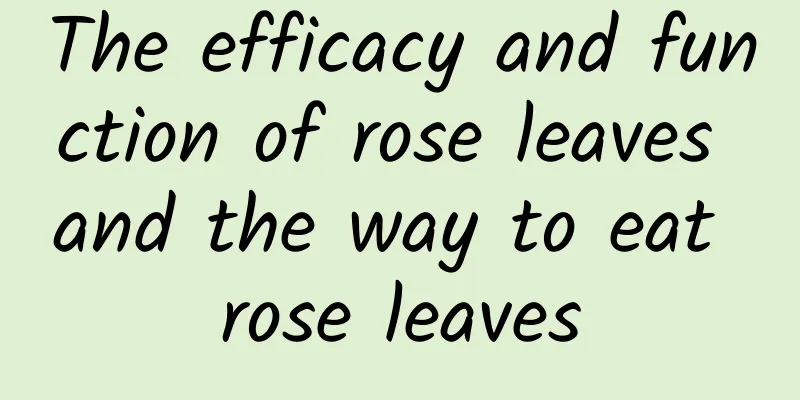The efficacy and function of rose leaves and the way to eat rose leaves

|
Rose is an ornamental plant that everyone knows. It has bright colors and attractive fragrance. The buds of roses can also be used as medicine to treat many diseases. So do you know about the leaves of roses? Do you know what they are used for? Not only the flowers of roses can be used as medicine, but also the leaves. Today, the editor will specifically talk about the effects and functions of rose leaves, and will also share with you how to eat them. The efficacy, function and edible method of rose leaves1. Characteristics of rose leaves Rose leaves are mostly harvested from spring to autumn, and can be dried or used fresh after harvesting. Rose leaves are mostly compound leaves, and have three to five leaflets. Its leaflets have the highest medicinal value. Fresh rose leaves have a slight odor and slightly astringent taste, and contain a large amount of water and a variety of trace elements. 2. The efficacy of rose leaves The leaves of rose are bitter and astringent, and have a mild nature. They can enter the liver meridian, and their main effects are promoting blood circulation, reducing swelling, detoxifying and stopping bleeding. They are usually used to treat various diseases such as human sores, swelling, bruises, low back and leg pain, and swelling and pain caused by external injuries. The therapeutic effect is very obvious. 3. Rose leaves can stop bleeding and detoxify The hemostatic and detoxifying effects of rose leaves are particularly obvious. When bleeding occurs due to external injuries, crush the fresh rose leaves and apply them directly to the injured area to stop the bleeding quickly. In addition, it also has a good therapeutic effect on human sores and swellings. The treatment method is the same as that for hemostasis. Just mash the fresh rose leaves into a paste and apply it externally. 4. How to eat rose leaves Rose leaves can be eaten as vegetables. They can be blanched and made into cold dishes, or they can be dried and boiled in water to drink. Both have good health benefits. They can detoxify, promote blood circulation and reduce swelling. However, rose leaves are more often used directly externally. When it comes to reducing swelling, relieving pain or stopping bleeding, the effect will be more obvious if rose leaves are used directly externally. |
<<: The efficacy and function of yellow chrysanthemum The medicinal efficacy of yellow chrysanthemum
>>: How to grow yew? How to grow yew?
Recommend
The effects and functions of slimming fruit and the benefits of eating slimming fruit
Have you ever eaten slimming fruit? It is also ca...
Nutritional value of mushroom protein and cabbage porridge
In fact, the method of making mushroom, protein a...
Ingredients and methods of Sanxian porridge How to make Sanxian porridge delicious
If you want to eat delicious three-fresh porridge...
The efficacy and function of the nucleus of the branch The medicinal value of the nucleus of the branch
Zhihe is a Chinese medicine name, which is a shor...
What is Panathinaikos like? Panathinaikos reviews and website information
What is Panathinaikos? Panathinaikos Athlitikos Om...
How to cook lettuce with oyster sauce and the nutrition of lettuce with oyster sauce
How many ways are there to cook lettuce with oil? ...
The nutritional value of truffles and the benefits of eating truffles
Truffle is a natural and precious fungus food. It...
What are the uses of aloe vera gel?
Aloe vera gel refers to the natural gel extracted...
How to eat white radish? Tips on eating white radish
White radish is a very common root vegetable, but...
How to eat morel mushrooms How to eat morel mushrooms
Morel mushroom is a wild mushroom that can be use...
Several misunderstandings about drinking lemon water What should you pay attention to when drinking lemon water
Many people like to drink lemon water, and some p...
The efficacy and function of the fortune tree The function of placing the fortune tree at home
The fortune tree is a green foliage plant that pe...
How to eat jackfruit seeds Tips on eating jackfruit seeds
The pineapple is a tropical plant belonging to th...
Zucchini nutritional ingredients and benefits
What kind of nutrition does zucchini have? Let me...
The efficacy and function of sand apples How to choose sand apples
I believe everyone is familiar with the effects a...









